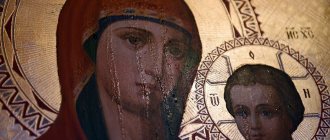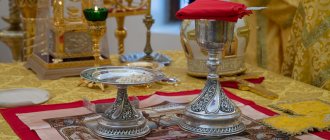A small upper room on Mount Zion is the place where, at a meal with Jesus and his disciples, the words that are now heard daily in the temple were first spoken:
“Take, eat, this is My Body...”
And then - about wine, His “Blood of the New Testament.” This was the first Sacrament of the Eucharist in the history of mankind. It remains the same to this day.
Holy Communion - what is it in simple words
This is the union of the believer with Christ, not only spiritual, but also physical. Through the prayer of the priest, the bread and wine are mysteriously “transformed” into the Body and Blood of Jesus.
This means that they, according to the theologian N.D. Uspensky, have “one nature of bread and wine, which do not cease to be such, and one supernatural nature, which the elements brought into the Holy Eucharist acquire through the action of the Holy Spirit on them.”
How the things of this world, remaining themselves, receive the Divine nature is a mystery inaccessible to the human mind.
What is the essence and meaning of Communion
The essence of the Sacrament itself:
- in the transformation of bread and wine into Body and Blood;
- in the very communion of the faithful with them.
The meaning of what is happening is to overcome the gap that arose between God and man after the Fall. Having fallen away from God of his own free will, a person in the same way, of his own free will and intention, can return to Him.
This opportunity is a great gift, unavailable for thousands of years even to the righteous of the Old Testament, who were not worthy of union with God - what can we say about the pagans? For centuries they tried to “storm the sky” - either by building majestic temples to the gods or by making bloody sacrifices. But human nature, which had fallen away from the source of life, did not give him the opportunity to see the right path to the lost Paradise - until the Virgin was found, who, in Her purity and innocence, was worthy to become the receptacle of the Incarnate God. And, most importantly, she agreed to trust Him:
“Behold, the servant of the Lord, be unto Me according to thy word...”
Thus, the Incarnation of Christ from the Mother of God opened the way for people to God - through union with Him, which is possible at any time through the Sacrament of Communion. But - only by the voluntary consent of a person, his request, that is, prayer. That is why the Spirit does not “spontaneously” descend on bread and wine, transforming them into Body and Blood, but through the prayer of the priest .
Every Christian is also free to deprive himself of the Sacrament or to begin the Cup of Life. The Lord is waiting for everyone to come to Himself.
What does it mean to “take Communion”?
One of the meanings of this word is “involvement,” that is, direct participation. You can be involved in an event, be part of a family or another group. A person can be called “involved” in some business or project. But through the Eucharist he becomes involved in God - literally physically. This is evidenced by one of the prayers of thanksgiving performed by a Christian after the Sacrament.
The person praying asks Jesus Christ:
“...Go into my hearts, into all my parts, into my womb, into my heart. The thorns of all my sins fell. Cleanse your soul, sanctify your thoughts. Confirm the compositions with the bones together...”
Why does a person need Communion?
It is necessary:
- the soul - then why the body needs food; this is spiritual “nutrition”, union with God, without which spiritual “starvation” will certainly occur: the world with its vanity will so enslave the soul that the road to Paradise will be completely closed to it;
This is how the saint writes about it. Paisiy Svyatogorets:
“When a person stops praying, he moves away from God and becomes like an ox: he works, eats, sleeps. And the more he moves away from God, the worse it becomes. The heart becomes cold, and then he can no longer pray at all...”
To prevent this from happening, it is necessary to unite with Christ.
- the body - it is subject to passions, the fight against which is impossible with human strength; It also happens that the Lord, through the main Sacrament, even deigns to heal the most terrible diseases, if such healing is useful to the sufferer and leads him to faith.
A well-known incident occurred in 1991 in the church of St. John’s Convent in St. Petersburg. It is described by journalist Dmitry Orekhov, author of the book “Holy Places of Russia”.
To the relics of rights. John of Kronstadt, the servant of God Valentina, who was sick with oncology, once came here - she had already been discharged from the hospital with the sentence “to go home and die.” They say that when she first entered the temple (even though she had lived nearby all her life, it was a quarter of an hour’s walk), she didn’t even know how to cross herself correctly. After listening to the patient, the priest blessed her to confess and receive communion daily. The patient began to come to the Sacrament every day - which could have been her last. It took her at least an hour to get to the monastery, she felt so bad. But what hurt worse than her body was her soul, burdened with sins... Therefore, the woman did not immediately notice that she was gradually reaching her already beloved temple faster and faster - now half an hour, now 15 minutes... Only a month later, during an examination, the stunned doctors stated: she is healthy!
What does Holy Communion give to a person?
Those who regularly approach the Sacrament say that it is:
- spiritual peace that Christ promised to His disciples: “My peace I leave with you, my peace I give to you...” (John 14:27);
- strengthening in the fight against sin and passions;
- unspeakable joy.
Why is Children Communion necessary?
Among baptized but unchurched parents there is a widespread belief that a child should be given communion “so that he doesn’t get sick,” “for healing,” “from the evil eye,” “so that everything is fine.” This is a deep misconception. Of course, God preserves and protects his beloved children, but Communion is a great Sacrament. By receiving communion, a child unites with God and is filled with joy, which in turn leads a person to true happiness. The sacrament can be seen as medicine and vital food. But medicine and food are not only for the body, but primarily for the soul. Communion is the unity of a person with God; it is vital for the spiritual healing of a person and the salvation of the soul.
“May the Lord forgive you your sins, just do not refuse to partake of the Holy Mysteries of Christ more often - this is the great help and mercy of God.” (Reverend Ambrose of Optina).
Read us conveniently on social networks:
Tags: how to give communion to a child, giving communion to children, giving communion to a child
First Communion of the Apostles
It took place at the Last Supper, when the Lord blessed the bread and wine - according to the Jewish tradition of the Passover meal. But in a different way than the Jews did: He gave them as His Body and Blood. It is no coincidence that the traditional Jewish Passover lamb was not present at that meal - for, according to the word of St. Paul, “Our Passover, Christ, was sacrificed for us” (1 Cor. 5:7)
Last Supper
The same, the first Communion, showed the consequences of unworthy Communion: the unrepentant Judas, who had already decided to betray the Teacher, not only did not receive the gifts of grace, but, according to the Apostle, “Satan entered into him.” He not only betrayed Christ. Even after repenting, he gave in to despair, reaching the point of suicide. And now, as the fathers say, similar things happen - even before illness, death, with unworthy people who approach without reverence or repentance.
Communion of children is the concern of parents
Communion of children is the most important part of spiritual life and raising a child as an Orthodox Christian.
Christ said: “Let the children come to Me and do not hinder them, for to such is the Kingdom of God. Truly I say to you, whoever does not receive the Kingdom of God like a child will not enter it. And he embraced them, laid his hands on them and blessed them.” (Mark 10:14 – 16)
Orthodox parents try as often as possible to bring their child to the Savior through Communion. The participation of children in church sacraments also creates a strong moral foundation for the individual. In the future, this will serve as a strong support for the formation of moral values and spiritual development of children.
How does the Sacrament of Communion take place in the Orthodox Church today?
The rules for preparing for the Sacrament are set out in the document “On the Participation of the Faithful in the Eucharist” adopted by the Bishops’ Conference on February 2-3, 2015.
For a summary of the document, read the article:
- On the participation of the faithful in the Eucharist
When can I take communion?
During the liturgy , in the morning. In large city churches it is served daily. There are also churches with small parishes, most often rural ones, where the liturgy is held only on Sundays. It is better to find out the time of its completion in person.
Divine Liturgy. Priest with the Holy Gifts
How to prepare and what time to arrive
Communion occurs towards the end of the liturgy, and its duration is usually about one and a half hours. However, it is not customary for Christians to come directly to Communion: the liturgy itself is a contact with the Last Supper of the Savior, a remembrance of it. That is why Christians, especially those who are going to receive communion, come to the very beginning of the service, trying not to be late, and pray especially reverently during it - for the sake of the upcoming Sacrament.
Fasting, prayer, confession
These are the three components of preparation for Communion.
Lenten work
Abstinence of the body is a necessary condition for preparing the soul for the Sacrament. Required:
- the so-called “preparatory fast”, or preparatory;
- The Eucharistic itself is just before the reception of the Holy Mysteries.
Preparatory fasting is abstinence from animal foods (meat, dairy, many also try not to eat fish). Spouses are also recommended to abstain from intimacy for a certain time. Finally, it is necessary to exclude entertainment and, if possible, attend religious services.
The duration of fasting is usually three days (if a believer approaches the Holy Mysteries often, for example, every 1-2 weeks, it can even be 1-2 days). Sometimes, if a person has not received communion for a long time or has serious sins, the preparation may last longer - in agreement with the priest.
Eucharistic fasting is a complete renunciation of food and drink from midnight until the Sacrament itself. The Church insists that those who are addicted to smoking should also abstain from tobacco. There are churches and monasteries where the liturgy (for example, the Presanctified Gifts) is served in the evening. Then the fast lasts at least 6 hours.
Prayers
It is usually customary to read the canons of repentance:
- Christ;
- Holy Mother of God;
- to your Guardian Angel.
The canons can be read one after another, or combined together. Sometimes pastors recommend that beginners, who are not accustomed to lengthy prayers, simply read one canon a day during the entire preparation for Communion. And some Orthodox Christians also zealously read the Akathist to the Sweetest Jesus.
Repentance
Finally, Communion is preceded by another Sacrament - confession . It is necessary, because, according to St. Simeon the New Theologian, “just as it is impossible for fire and water to be together in the same vessel, so it is impossible for both the most pure Body of Christ and the abomination of sin to be together in the same Christian .
It is better to find out in advance about when Confession takes place in a particular church. As a rule, it is performed during the evening service, based on the desirability of the presence of the communicant at the service on the eve of the Sacrament. If for a good reason (being busy at work, at home with small children, health conditions) a believer was unable to attend the service in the evening, he can also confess in the morning. However, this must be agreed upon with the priest, preferably in advance.
Follow up
These prayers are performed in the morning, usually before leaving the house. The sequence consists of:
- short prayers that have a very ancient origin, from the first centuries of the Church; in everyday life they are also called the “ordinary beginning”;
- several psalms, including the penitential 50th (Have mercy on me, O God...);
- The Canon, the refrains of which are taken from this Psalm;
- prayers composed by St. John Chrysostom, Basil the Great, Simeon the New Theologian, and other saints.
What is needed for Communion in church
After the queue has lined up, you must:
- fold your arms crosswise on your chest,
- It is not customary to place the sign of the cross in front of the chalice,
- after your turn approaches the priest, you must say your name and open your mouth to put in a spoon with part of the Blood and Body,
- lick the liar well with your lips,
- after blotting your lips with a handkerchief, you need to kiss the edge of the bowl,
- without talking or kissing the icons, you need to move away from the pulpit and take a drink (wine with holy water and part of the prosphora),
- After the ceremony, it is worth reading or listening to prayers of gratitude.
The best article for you, go to: Is it possible for Orthodox Christians to wear the Star of David?
After performing such a sacrament, you should protect your soul and body from sins and other negative influences. Many clergy say that such a ritual should be performed at least once a month. This is how we help our soul cleanse itself. After all, long-term refusal of it can lead to disaster of the soul.
To take communion or not is purely everyone’s choice. Just remember that you must consciously approach this process.
The Lord is always with you!
How to approach the Holy Chalice and other rules
When the Holy Gifts out of the altar,
“Come on with the fear of God and faith!”
At the same time, everyone bows to the ground. It is replaced by a waist bow when it is not customary to bow to the ground during divine services - for example, these are the days of Bright Week after Easter.
Then everyone who has the blessing proceeds to the Chalice. Usually:
- Children are the first to receive communion, as well as the weak and sick;
- then - men, however, in many parish churches this is not strictly observed;
- after them - women.
When approaching Communion, a Christian:
- folds his arms on his chest in a cross, the right hand should be on top;
- does not cross himself in front of the Chalice, so as not to accidentally touch it;
- clearly states his name given at Baptism;
- accepts the Holy Gifts into the mouth;
- after that he kisses the Cup.
How often should you take communion?
Until 1917, there was a practice of starting the main Sacrament only once a year. Some also received communion in all four fasts of the church year.
Modern pastors most often advise doing this at least every month. Some try to receive communion more often, while others begin the Sacrament once every few months, but regularly.
The frequency of communion is usually determined by the spiritual state of a person, his desire, and, of course, it is worth consulting with a confessor or simply a priest of the temple.
What to do after Communion
At the end of Communion, you do not need to leave immediately, you must wait until the end of the liturgy and venerate the cross. Then, most often, prayers of gratitude are read, which everyone who has been honored with Communion remains to listen to. If for some reason the prayers are not read publicly, you can thank the Lord yourself, in church or at home, depending on the circumstances. Prayers of thanksgiving are in prayer books; they usually appear after the Follow-up to Communion.










